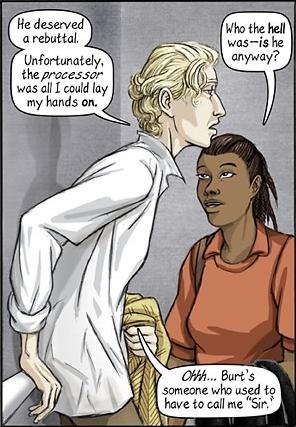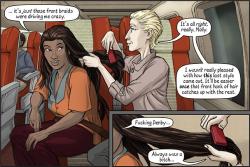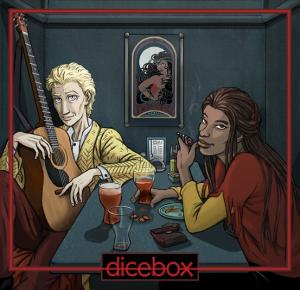Dicebox isn’t your older brother’s science fiction comic. No muscular heroes toting huge laser cannons, piloting light-speed-capable spaceships, rescuing buxom and scantily clad females, thwarting evil empires, and, in general, saving the universe.
The science fiction of Jenn Manley Lee’s Dicebox is more akin to the soft/feminist science fiction of Ursula K. Le Guin and Octavia Butler. According to the author’s notes, Dicebox is the story of an eventful year in the lives of two middle age women, itinerant workers who are traveling across the galaxy. With an internet full of science fiction webcomics inspired by anime or 1950s pulp, Dicebox promises an interesting change of pace.
Dicebox was reviewed by Comixpedia 18 months ago, back when Lee was just completing the second chapter. With mostly just introduction and bits of foreshadowing, the reviewer concluded that it was a beautifully illustrated story with enough potential to make it a worthwhile read. In the time since the review, Dicebox has moved to girlamatic.com, and more than doubled in length with extra chapters contributed by guest comickers. With 36 planned chapters, it’s years from even being at the halfway point, but Lee has already moved the story beyond initial setup and it seems appropriate for an update review.
 A true definition of feminist science fiction is probably beyond the scope of this review, but it’s sufficient to observe that science fiction can allow the exploration of gender and gender roles by creating worlds where traditional conceptions and expectations don’t apply.
A true definition of feminist science fiction is probably beyond the scope of this review, but it’s sufficient to observe that science fiction can allow the exploration of gender and gender roles by creating worlds where traditional conceptions and expectations don’t apply.
In Dicebox, the most obvious example of this is Griffen. With her angular body and strong facial features, not to mention her abrasive personality, more than one reader – myself included – has mistaken her for a male. Lee is more than capable of drawing feminine females, and Griffen’s looks aren’t confusing to other characters. Rather, it’s a quality of the Dicebox universe that Griffen neither conforms to the standard “tough chick” stereotype of Hollywood sci-fi or the “butch lesbian” of US culture.
The ambiguity of Griffen’s gender provides an interesting riddle to readers who don’t check Lee’s F.A.Q., but also can distract from the story. Lee’s characters Rande Yong and Grae also defy gender classification when they are introduced, but the confusion is cleared up when they become central to the plot, thus allowing the audience to focus on the story.
There’s certainly a lot of story to Dicebox. Lee has a gift for writing unstilted dialogue that is also conveying information about the world, and Molly and Griffen’s acquaintances. In addition to the tantalizing hints about Molly’s weird visions, Griffen’s questionable past, and the mystery of the Strangers, our heroines have to date been caught up in a terrorist attack and survived a crash landing on an uninhabited planet.
 It’s good that Lee keeps such interesting things happening, but frustrating that much of the action happens off screen. The details of how the ship crashed involve a gun and possibly illegal actions by other crew members, but we only get these details in conversations afterwards. Considering that both Griffen and Molly were involved, it seems odd to not show any of this.
It’s good that Lee keeps such interesting things happening, but frustrating that much of the action happens off screen. The details of how the ship crashed involve a gun and possibly illegal actions by other crew members, but we only get these details in conversations afterwards. Considering that both Griffen and Molly were involved, it seems odd to not show any of this.
Another example of missing panels is when Griffen needs to scale a cliff, a task she clearly doesn’t want to do. There’s the panel of a nervous Griffen before, and the panel after, with a panting-on-the-ground Griffen, but no Griffen clingling to the side of the cliff for dear life. Granted, it’s a predictable sequence of events to show, but comics are a graphical medium. Unless there are specific reasons to do so, cutting out such scenes seems a disservice to the readers.
 Lee’s omissions aren’t due to lack of artistic ability. Dicebox is a beautifully drawn comic with fantastical space stations and cities, and precisely detailed technology, such as the handheld screen units. Lee is very comfortable drawing the human figure and the comic is filled with interesting body positions and gestures, drawn from numerous camera angles.
Lee’s omissions aren’t due to lack of artistic ability. Dicebox is a beautifully drawn comic with fantastical space stations and cities, and precisely detailed technology, such as the handheld screen units. Lee is very comfortable drawing the human figure and the comic is filled with interesting body positions and gestures, drawn from numerous camera angles.
Most impressive is Lee’s eye for coloring and shading. Each particular scene has its own palette that greatly aids in giving locations a unique sense of place and reinforces the mood of the scene.
Overall, Dicebox is continuing to be an intelligent, thinking person’s sort of science fiction story. It’s progressing from the initial set of ideas to actual short stories about the main characters’ lives, and there is a strong connection between the chapters. A bit more visual storytelling would improve the pacing of the story as well as giving more connection to the characters and their situations. When Dicebox includes these aspects, as it does for the terrorist attack plot, the comic begins to realize the full potential of a true, non-testosterone driven, science fiction webcomic.
“Unless there are specific reasons to do so, cutting out such scenes seems a disservice to the readers.”
I would argue the exact opposite here–Unless there are specific reasons to show a scene, the scene should be cut. (Admittedly, that’s partly my playwriting background asserting itself.) The fact that the crash scene is left out was actually one of the details that highlighted for me the deftness of Lee’s writing. She was writing a story about the aftermath of a crash landing. Leaving out the crash itself heightened the tension of the aftermath–whereas actually showing the crash would have made what followed seem anticlimactic. I was really impressed by this particular choice.
I did find it odd that the mountain climbing bit was truncated–since there was buildup to it, I would have thought it worth seeing the execution of it.
I really did like the way the Chapter 3 opened with the crashed ship and the shooting of the horses. But because I never was able to piece together how the crash occurred, I never could figure out if Rande and Grae were really untrustworthy people or if it was all a misunderstanding. And because of the ambiguity, the whole situation felt less edgy and less tense.
Which isn’t to say that the comicker needs to reveal to the audience the true nature of their characters, but if too much is left up for the audience to figure out on their own, then their emotional and logical responses the comic won’t be in tune with what the story is telling, leading to confusion and potentially frustration.
For my own admitting, my background is in the sciences and the only formal writing class I’ve taken is a science journalism course – both of which stress clear communication of ideas over other aspects.
There’s also a lot to be said for a story/poem/work of art that reveals more of itself each time you view it. It might be that a later scene with Rande or Grae will completely change my interpretation of Chapter 3.
Good points. I do believe the incidints leading up to the crash were explained, but not all at once, making it much harder to piece everything together. From what I recall (and I have a few fuzzy spots myself), there was plenty of blame to go around, including to Gryffen. I think the idea was that the sequence of events actually *was* a chaotic mess that was hard to piece together…but I don’t recall precisely. Yeah, this is one that will require re-reading.
The reviewer thanks you for your thanks. She’s got a big grin on her face.
I’d be a fool to say that Dicebox is without criticism, but at this point i am possibly still a fool, I have such a deep admiration for the comic.
I think that the absence of the action scene has been to the benefit of the comic. It all makes you think and have to piece together the puzzle. But also, the story is about character, about these people. What’s important about an action in this story doesn’t seem to be about how that action drives the plot, but rather the way in which it affects the characters. So, unless there is an action that needs to be shown specifically for it’s impact, I think it’s stronger to eliminate the scene, as Jenn has wisely done.
Even the cliff climbing, I don’t think it was building up to her climbing the cliff, it was simply illustrating Griffen’s personality. Her refusal to do things once she sets her mind against it, even if she’s capable, and then the complaining afterwards. it’s perfect. A climbing scene would have been goofy and made clumsy the pacing.
And my interpretation of the gender roles is this, the traditional way to handle the crossing of gender roles is by making it clear whether it is a male or female, and having them cross the gender-role line. I prefer jenn’s method of this, simply put: it’s not an issue. I don’t think Jenn’s trying to make us guess and wonder, but simply saying that in this future, gender is a construct which society seems to accept as not having to exist any more.
Anyhow, good review, and great comic. Yay! 🙂
-Christopher Baldwin